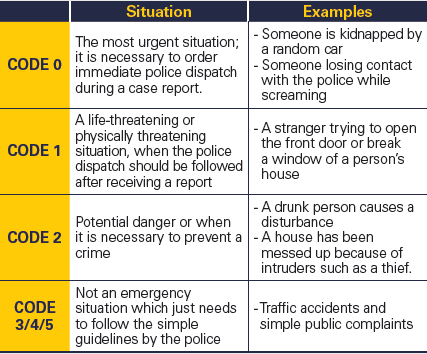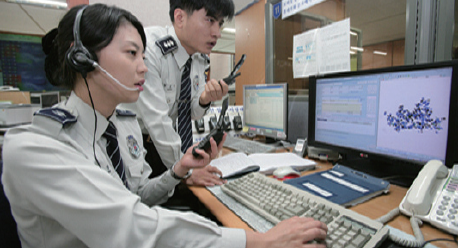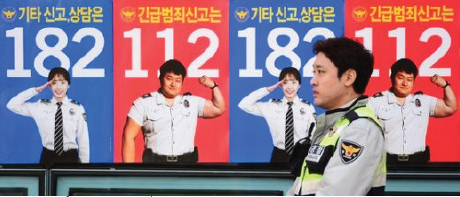Recently, around 1.15 million people have petitioned the Blue House for a stricter punishment of the Gangseo-gu PC room murderer. This number shows that citizens are feeling anger toward the poor initial response of the police. If the police had made a more active initial response to get the victim safely home after receiving the report, the victim could have been saved. The inefficiency of the initial police response, however, raises the question as to whether it is just an issue of the police system or individual police officer’s problems. Therefore, the Sungkyun Times (SKT) now discusses the problems of the initial police response and suggests how to improve its system through personal and social analysis.
The Concept of Initial Police Response
The Definition of Initial Police Response
The initial response is an emergency measure taken by the police, who arrive at the incident site first in order to secure evidence and arrest the suspect. Three principles of the initial responses are to save the injured victim, arrest the suspect on site if needed and preserve a crime scene. There are four procedures for initial responses: accessing the site, reporting the situation, emergency deployment and arrangement of investigation, and suppressing the crime and arresting suspects.
<Current Status of Initial Response Through the Timeline of Lee Young-hak Case>
The Lee Young-hak case is about the murder and molestation of a young girl who was a friend of Lee Young-hak’s daughter. Lee Young-hak took the victim to his house, caused her to fall asleep by making her drink a beverage with a sleeping pill in it, and killed her after molesting her. The current state of the lack of initial police response can be described through the case timeline.
➊ On September 30th, 2017, 11:20 p.m., the victim’s mother called to report to the police that her daughter’s cell phone was turned off, and she was not coming back home. After this, the control center accepted the report and ordered the Women’s and Juvenile Affairs Division of the Mangwoo District Police to dispatch the necessary staff. The officer and the investigator who were on night duty, however, made a false report, reporting as if they had visited the incident site.
➋ Even though the district police should have asked about the victim’s last traces according to the regulations when they met the victim’s mother, they never asked for this information.
➌ By 11:50 p.m., the victim’s mother had described what the victim’s features were and what clothes she was wearing and gave her name through a telephone conversation with Lee Young-hak’s daughter at the district police station, but no one paid attention to it.
➍ The officers who were on night duty should have controlled the whole situation with proper instructions, such as dividing the search locations and commanding the objectives, but they did not give any instructions to their subordinates.
➎ On October 1st, the victim was strangled to death, and her body was later abandoned.
➏ The head of the Women’s and Juvenile Affairs Division reported the alleged crime connection to the leader of the Lee Young-hak case investigation team on the morning of October 4th. The alleged crime report was delayed since it was not handed to the investigation team leader until 9:50 p.m. on October 2nd.
This case shows that the police took an initial response in a passive manner by making false and delayed reports. Since a clear and prompt report is the basis and principle of criminal investigation, false and delayed reports may eventually result in a loss of the most important period of time needed to solve a case. Therefore, the attitude of the individual police officers is also important because procedures for a case can be influenced by how the police think and what they regard as important about their initial response.
Problems of Initial Responses of Korean Police
Unestablished Case Submission System
It may be no surprise that a victim might be embarrassed or shocked when he or she reports a case and therefore, cannot report it properly. Sometimes, the police, who need to keep calm during a response, may also become agitated and even irrational because of an emergency report. Consequently, this can prevent the reported case from being classified as a correct case code. According to the Korean National Police Agency (KNPA), the number of emergency reports in 2014 with a code one or more critical was 11.3%. In fact, the 3% of reported cases should have been classified as code ones or more critical codes, but the correct classification was not conducted during the case submission. Also, a disconnected report system in Korea, having emergency telephone number 112 for crimes and 119 for fire incident and ambulance, is a problem in that it takes time when the police have to call for help from a fire department. To save a life of the injured on the spot, rescuing a victim on a faster time is as important as immediate dispatch from the police in the cases of violent crimes like murder.
When the police report center takes a case report from a member of the public, the following response level is classified into five codes based on how urgent a reported case is by the standard of a situation, voice, and surrounding noises.

Problems of One-way Commanding and Reporting
Most of the time, police officers get to a crime scene first. When middle-ranking officers arrive, lower-ranked officers hand over their command to them. In order to make crime investigation procedure go well, executive officers’ right judgments are crucial. Those who get to the crime scenes first, however, are not normally higher-ranked officers. In other words, inexperienced and low-ranked officers’ incorrect judgments might be reported directly to a superior authority without their proper considerations. If their judgments happened to be wrong, initial responses might be severely delayed. Also, there are no systems to prevent police officers from reporting incorrectly or later than they have to. Since a criminal case is investigated by many police officers, it is difficult to accuse someone of wrong or delayed reporting. Moreover, punishments of wrong command and report regarding initial responses are not established by criminal law. Instead, officers only get punished based on their own police law, which can lead them to think that command and report might not be as important as they actually are.
The Absence of Desirable Concepts of Initial Police Response
Because the judgments of the police officers at crime scenes can vastly affect the investigation process, their responsible initial responses are required. One of the reasons for unreliable police initial response is the current performance evaluation system of the police. The current performance evaluation system does not include crime prevention or victim protection, but it mainly focuses on criminal arrest rates. As a result, rather than preventing potential crimes, officers might concentrate more on arresting criminals after a crime happens. Some officers also do not even fully understand the definition of the initial response. According to a survey conducted on 100 officers by the Daejeon Dongbu Police Station, more than half of them said that the police initial response is about arresting criminals and collecting evidence at a crime scene. This survey indicates a lack of understanding of police initial response as an administrative definition. Many officers just call it “initial response” not knowing what they can do, what their position is during the investigation process or what their role is. The officer’s strong authorities for smooth investigation can become an obstacle of police officer’s active investigation. In particular, to not infringe on the rights of civilians during the seizing and searching process, officers have to be overly careful when responding to case submission, which can make the investigation process harder.

Possible Plans to Improve Initial Responses
Professionalized and Systemized Case Submission
The location of a criminal, understanding whether an assaulter has a weapon, if there are any accomplices, and establishing if the criminal is drunk or on drugs, is the information needed to minimize disruption in the case submission. Current police officers rotate call center duty, but their ability to professionally receive a report during an emergency can be lacking due to insufficient manuals for their initial responses. Therefore, making manuals for initial police response in the case of an emergency call is needed. In response to this, Korea has been trying to separate the role of 112 and 182, like the United States (US) and Japan do. 182 Police Civil Complaint Center tend to oversee civil affairs such as fines or driver’s license information. In an effort to make 112 emergencies crime hotlines, the police may need to advertise to civilians to make light complaint calls to 182. Professional call center specialists who are trained to receive crime reports have to be positioned at adequate spots. For example, in the United Kingdom (UK), the US, Canada, and other European countries, a unified crime reporting system is operated and non-governmental call center experts are present.

Quick and Accurate Command and Order Issuance
Police officers need to be trained ceaselessly to acknowledge the person in charge during police initial response, and how to properly report in cases of emergency. Efforts to handle cases more quickly are necessary day and night by all police officers, including high-ranked officers, even when they are not on duty. The police should also reinforce regulations regarding delayed or incorrect case reports to make officers feel obliged to report immediately and correctly. Police officers would not get judicial punishments even if they did not report a crime. Therefore, there is not much pressure for them to do so. Some officers may even prefer taking punishments from a disciplinary committee of the police to reporting properly. To solve this problem, reinforced penalties could be a solution to make officers report more from a sense of duty. By improving directly to superior authority. Professional Police Investigation (PPI), the police may encourage greater harmony among police departments. PPI is an independent personnel system which categorizes special fields to the general police. When investigating, both investigative police and the general police are essential. The current separated system, however, makes cooperation between the departments difficult. Therefore, through improvement of PPI, the police can foster harmony that is helpful to overall police performance and systematic crime reporting.
Development of More Reliable Initial Police Response
Enacting detailed scope of permitted actions and limits about the initial response by law will help officers take better actions. The present initial response is contrarily holding officers back from sometimes taking the right course of action. By setting specific scopes and by limiting search and seize during initial response, officers can take permitted actions being less aware of infringing on civilian rights. The right to search and seize, however, should be applied differently by law in accordance with the importance of the crime. The UK, for example, has set articles of procedures and the rights during the initial response in the Police and Criminal Evidence Act. Moreover, improvement of awareness that protection of victims is more important than solving a case itself is needed for all officers. In the UK with the establishment of Victim Support (VS), officers can be educated to think more from the victim’s point of view. VS can also determine and provide the method, time, and place of the interview considering the victim’s physical and psychological condition to help minimize the damage.
Whenever people see unfortunate accidents or incidents, they imagine what would have happened if the police had actively engaged in active initial response. The current initial response, however, is not a police officer’s problem. Rather, it is a problem of the whole system that can be mended with effort. Delicate systemization of crime reporting and a responsible mindset of all police agents are what it takes to quicken and improve general initial response. Manuals established accordingly to situations and training by case are also an integral part of the improvement process. Moreover, the police’s credibility would continue to increase if the police take measures to improve their initial response to cases.
